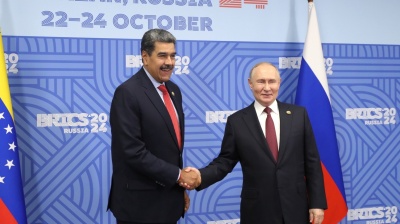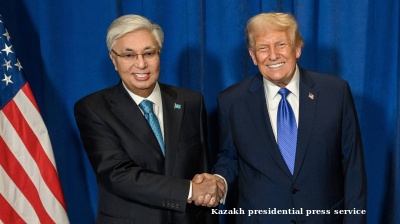Tajikistan's lower chamber of parliament on February 7 approved amendments to the laws on presidential and parliamentary elections based on a May 2016 national referendum, lowering the age of eligibility to run for the presidency and legislative posts in parliament's upper chamber from 35 to 30.
Tajik President Emomali Rahmon is widely believed to be grooming his eldest son, Rustam Emomali, to eventually succeed him as president. Thus, should the now 65-year-old Rahmon decide to step down in time for the next presidential election in 2020, the amendments will enable Rustam, now 30, to step in as his successor. Last year, Rahmon appointed Rustam as mayor of Tajikistan's capital, Dushanbe - Rustam replaced Mahmadsaid Ubaidulloev, who was Dushanbe’s mayor for 19 years.
The amendments also bar presidential and parliamentary candidates from receiving financial support from from foreign organisations and citizens. Moreover, the Central Election Commission will be granted the power to approve detentions and arrests of formally registered presidential candidates. That is likely a measure put in place to crack down on opposition candidates who might threaten the power of the Rahmon family.
The bill will be signed into law by Rahmon after receiving approval from the upper chamber of parliament.
Other amendments from the May 2016 referendum have allowed the Tajik president to run for reelection indefinitely.
In December 2015, the authorities have endorsed another bill that granted Rahmon and his relatives lifelong immunity from prosecution and gave Rahmon the title of “Leader of the Nation”.
With the destruction of the Islamic Revival Party (IRPT) and banning it as “terrorist” in 2015, Rahmon has eliminated any serious challenge to his rule in the country. Currently, the Tajik authorities have been attempting to eliminate any remnants of the opposition party.
Tajikistan's Supreme Court has put the IRPT leader, Muhidding Kabiri, on trial in absentia last week. Charges against Kabiri include terrorism and supporting Abdukhalim Nazarzoda, an ex-deputy defence minister and rebel general, who was allegedly planning a coup and was killed in 2015 by Tajik authorities in a shootout.
The IRPT failed to enter parliament in the February 2015 election, which international observers considered neither fair nor free. Kabiri announced in June 2015 that he had gone into self-imposed exile amid repeated threats and fear for his life.
The Supreme Court gave life sentences to two leading figures of the banned IRPT in 2016, while 10 other party members received up to 28 years in jail.
News

US prepares attack on Venezuela as Maduro begs Putin for aid
The Trump administration has reportedly drawn up a list of potential military targets within Venezuela as part of its intensifying pressure on President Nicolás Maduro, who has turned to Moscow seeking urgent military assistance.

Bulgaria suspends fuel exports to EU after US sanctions Lukoil
Bulgaria has temporarily suspended exports of petroleum products to European Union countries after the United States imposed sanctions on Russian oil giant Lukoil.

Tens of thousands rally in Serbia's Novi Sad one year after deadly station collapse
Tragedy that killed 16 people has become a symbol of public anger over corruption and negligence, fueling Serbia’s largest protest movement in more than a decade.

US push to pressure Iran providing fresh incentive for trans-Caspian pipeline
Turkmenistan showing interest in the idea.




